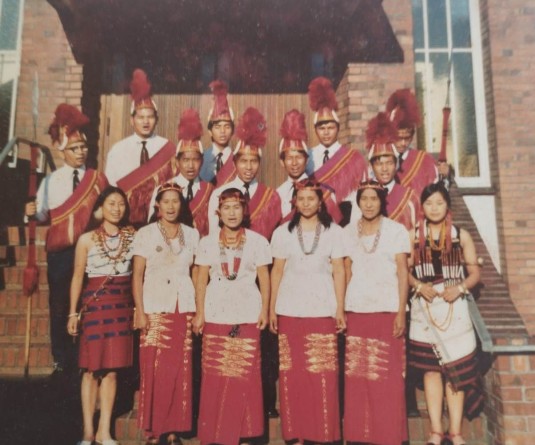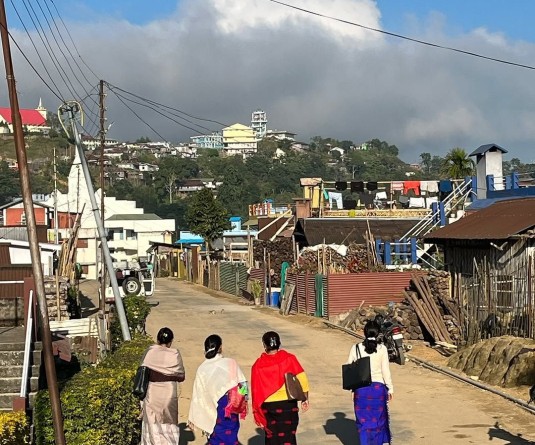
Villo Naleo
Psalm 133 is a short but candid description of celebrating unity among human relationship. In this psalm the word ‘unity’ encompasses God’s dwelling that will transcend human differences. It calls us to stay united, to stay connected and to stay stronger together. This psalm proclaims the spirit of unity among brothers. It accentuates the spirit of unity and the possibilityto foster sanctification, righteousness that can refresh our lives on earth. Let me relate this psalm with the estranged relationship between the Southern Angami and the Mao community.
Ps 133:1 How good and pleasant it is when brothers live together in unity! This unity is not about living together in one locality, under one political jurisdiction or one state. The Jews were scattered all over the world and for several reasons, they come to Jerusalem for feasts and celebrations, for religious duties and requirements. During these feasts and pilgrimage they come and celebrate their common heritage: redemption from Egypt and encampment around the tabernacle in the desert (cf. Num 2).
Thus, the Psalmist here pronounces blessing on those who live in unity, regardless of their situation, location and vocation. Their cohesion was in conformation with the regulations for the three annual feasts Pesach (Passover), Shavout (weeks or Pentecost), and Sukkot (Tabernacles). They all come to fulfill one purpose, to proclaim God’s faithfulness.
We say we are siblings, having one common identity originated from Makhel. Unfortunately, we are separated by political boundary. The imagery boundary created by the aggressors, trying to break our solidarity and brotherhood by renaming places, imposing 144 CrPC, and setting military posts in our land are like a thorn in the flesh. Our dialect may differ from village to village, but our common heritage of land holdings is same.
We all have used the resources from the Kezol-tsa (a virgin forest primarily covered with thick forest, it comprises of three mountain ranges; Mt. Tempü, Khronyhü range and Tevuthwe range). This was a common heritage for our livelihood and today, it has become part of our identity from our ancestor’s time. Due to its rich resources in flora and fauna, people living nearby have accessed the forests for several reasons. For us it was cane, for some it was banana leaves (for traditional rites), traditional gates, rice pounders andpersonal use.
Ps 133:2 It is like precious oil poured on the head, running down on the beard, running down on Aaron’s beard, down upon the collar of his robes. When God’s people come together there is power and exuberance emitted in our gathering. And when this gathering has a common object and purpose, it’slike Christians fellowshipping to glorify and worship God.
The Psalmist compares the expression of harmonious unity to the special, fragrant oil used by the priests (cf. Ex 30:22-33). Only the high priest and the other priests could be anointed with this oil. Aaron as the “head” of the priestly clan is representative of all the priests.
Our ancestors have acknowledged each other’s presencee by paying royalty and homage to elders and traditional owners of the Kezol-Tsa, in the form of giving shawl made of nettle plant, salt and banana leaves. Ownership doesn’tmean exploitation and dominance but for reverence and continuity.
Fellowshipping is to acknowledge each other’s presence in honor of the Creator and sustainer of the all human beings. Like the oneness of God is celebrated through the diversity of the Godhead: Father, Son and the Holy Spirit. Sadly, due to our human ego and bad precedence, we are trying to disengage instead of coming together. We are trying to feed each other with snakes when one is asking for fish.
There could be diversity in oral traditions; there could be divisiveness in political aspirations due to geo-political dislocation. But when diversity arises to challenge preferences like political and economic advantage, there is connection rather than separation. There is solidarity in displacement, dislocation and separation.
Ps 133:3 It is as if the dew of Hermon were falling on Mount Zion. For there the LORD bestows his blessing, even life forevermore. Because of its high altitude and abundant precipitation of rain, snow, and dew, Mount Hermon was well-known for lush greenery even during the summer months (cf. 89:12) and for its dew that sustained the vegetation. The experience of the pilgrims is like that of the refreshing dew of Hermon. During the summer months virtually no precipitation falls on Jerusalem. Regardless of how harsh the conditions of the pilgrimage takes, the fellowship of the brotherhood of God’s people was refreshing.
How I wish Kezol-tsa becomes Hermon for all India. If all Christians live like Christ and do what God wants us to do, this imagery is not far from reality. To make this imagery a reality, I want to extol Christian stewardship towards our environment. Instead of fighting for ownership and dragging the powers that be into this family issue, why not acknowledge the traditional ownership and oppose developments that could deplete forests resources like flora and fauna. Instead of banning the other, why not we together banned logging, hunting and burning of the forests surroundings. Let us burn our ego by trying to understand each other’s point of view. Let us bring our selfishness and dishonesty before the Lord. God has located us to be custodians of our humble dwellings (villages), let us not turn it into the devil’s den.
The dews of Kezol-tsa will nourish and replenish this country and neighboring countries, only when we take our responsibility towards our environment seriously. Why not promote eco-tourism together? Why not exert that traditional boundary exists, and thatimagery political boundaries cannot override it? Why don’t we show that brotherhood transcendstemporary political friends? Why not we talk our differences openly and embrace each other like our ancestors had done before. Reinhold Niebuhr said; “It’s always wise to seek the truth in our opponents’ error, and the error in our own truth.” May God, help us find out the error in our truth as soon as possible.We must come together and find amiable ways to heal our hurts and talk like brothers.





